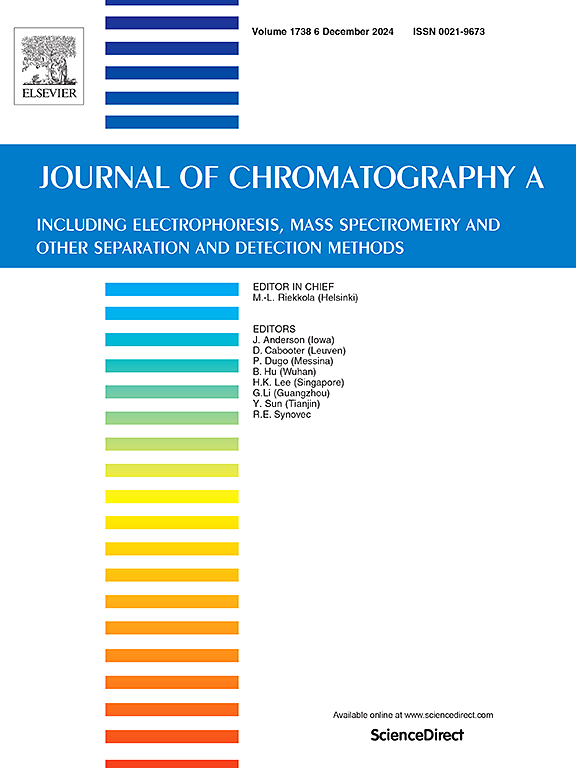利用气相色谱-串联质谱法自动测定唾液中 3-6 环多环芳烃的直接浸泡-固相微萃取法。
IF 3.8
2区 化学
Q1 BIOCHEMICAL RESEARCH METHODS
引用次数: 0
摘要
本研究采用固相微萃取法(SPME)结合气相色谱-三重四极杆质谱法(GC-QqQ-MS),提出了一种分析唾液样本中多环芳烃(PAHs)的新方法。该方法采用最新的商用涂层纤维(PDMS/DVB/PDMS)直接浸泡萃取目标分析物,可测定 13 种多环芳烃,包括低挥发性化合物。采用中心复合设计(CCD)对 SPME 萃取方法进行了优化。对纤维涂层长期稳定性的评估表明,萃取性能优异,无明显降解。验证程序确认了所有参数的良好性能,LOQ 值(10 种分析物为 100 ng/L,3 种分析物为 500 ng/L)与其他色谱法相当。利用最近提出的两个指标:绿色分析程序指数(GAPI)和样品制备的分析绿色度量(AGREEprep),对该方案的环境影响进行了客观评估。这两项指标均显示出良好的整体环境友好性,尽管使用了对环境影响较大的仪器,但 AGREEprep 的综合得分令人满意。这些特点使得所开发的方法适用于环境和流行病监测的常规分析。本文章由计算机程序翻译,如有差异,请以英文原文为准。
A direct immersion-solid-phase microextraction method for the automated determination of 3- to 6-ring polycyclic aromatic hydrocarbons in saliva by gas-chromatography-tandem mass spectrometry
This work presents a novel method for the analysis of polycyclic aromatic hydrocarbons (PAHs) in saliva samples using solid phase microextraction (SPME) coupled with gas chromatography-triple quadrupole mass spectrometry (GC-QqQ-MS). The protocol utilizes the latest commercially available overcoated fiber (PDMS/DVB/PDMS) for direct immersion extraction of the target analytes, enabling the determination of thirteen PAHs, including low-volatile compounds. The SPME extraction method was optimized using a central composite design (CCD). The evaluation of the fiber coating's robustness over time demonstrated excellent extraction performance with no significant degradation. The validation procedure confirmed good performance for all parameters, with LOQ values (100 ng/L for ten analytes and 500 ng/L for three analytes) comparable to other chromatographic methods. The environmental impact of the protocol was objectively assessed using two recently proposed metrics: the Green Analytical Procedure Index (GAPI) and the Analytical Greenness metric for sample preparation (AGREEprep). Both metrics indicated good overall environmental friendliness, with AGREEprep providing a satisfactory comprehensive score despite the use of highly impactful instrumentation. These characteristics make the developed method suitable for routine analysis in environmental and epidemiological monitoring.
求助全文
通过发布文献求助,成功后即可免费获取论文全文。
去求助
来源期刊

Journal of Chromatography A
化学-分析化学
CiteScore
7.90
自引率
14.60%
发文量
742
审稿时长
45 days
期刊介绍:
The Journal of Chromatography A provides a forum for the publication of original research and critical reviews on all aspects of fundamental and applied separation science. The scope of the journal includes chromatography and related techniques, electromigration techniques (e.g. electrophoresis, electrochromatography), hyphenated and other multi-dimensional techniques, sample preparation, and detection methods such as mass spectrometry. Contributions consist mainly of research papers dealing with the theory of separation methods, instrumental developments and analytical and preparative applications of general interest.
 求助内容:
求助内容: 应助结果提醒方式:
应助结果提醒方式:


